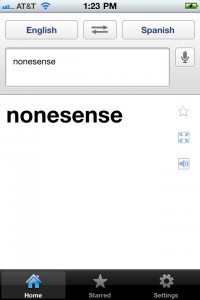In Google We Trust (Or Used To)
04/24/11
I have been accused in the past of sounding confident and convincing, even when I don’t know what I’m talking about (there are a few examples in a blog I write called “Love, Translated”). But Google has me beat.
(Note to Google, the search engine: Please don’t take this personally and don’t lower my ranking as punishment for the criticism…you know I love you)

Google's translation of a misspelling of 'nonsense'
With its new, ridiculously fast and user-friendly Google Translate app for the iPhone, Google seemed to bring our family into a new era of complete and uninterrupted language learning where the language gaps that I wrote about here and here and here would become a thing of the past.
But would it hurt Google’s standing as the world’s preeminent maker of everything awesome to be humble enough to admit when occasionally it can’t find what you’re looking for?
This past weekend, I was all gung-ho, looking forward to siting down with Gabriel to do real-time translation in Spanish of any book in English he wanted to put in front of me, confident that no rare Alaskan fish, no obscure two-headed dinosaur could escape the boundless reach of Google’s knowledge.
So Gabriel busts out the dinosaur books, and we start off great — all we have to do is speak the name of any critter into the iPhone and before you can say “you’re jamming your elbow into my rib”, we have a Spanish translation for the word, complete with a small speaker icon you can click on to hear the word spoken in a trust-inspiring female voice with a Castilian accent. It was a thing of beauty, until the skeptic lobe of my brain came back online and tempted me to try to stump the app.
I start garbling the words I speak into the app to see what happens, and wouldn’t you know it, Google Translate just goes ahead and says that the translation in Spanish for the made up word is nothing other than the word itself! And when you click on the little speaker icon? The sexy, trustworthy Castilian lady speaks the word back to you with a very convincing Spanish pronunciation that makes you think you’ve subconsciously fed the app a word that actually exists.
The image here is a screenshot of what you get if you misspell “nonsense” and ask to translate it into Spanish. When you click to hear the Spanish word spoken, you hear a very graceful and natural “noneh-senseh,” which to a less-informed Spanish speaker may sound like a viable term to refer to people who were born in the province or country of “Nonesenlandia”.
Of course, I’m not claiming to be so principled that I won’t use the app at all anymore, but the tool has certainly replaced a knowledge gap with a big hole in my confidence in Google.
Google – you already know everything about me. Would it kill you to start being honest with me? I will continue to love you despite your imperfections. Don’t give me that nonesense.


Hee hee… I don’t have an i-phone so can’t check the app out myself but you explained it so well, I can totally imagine it.